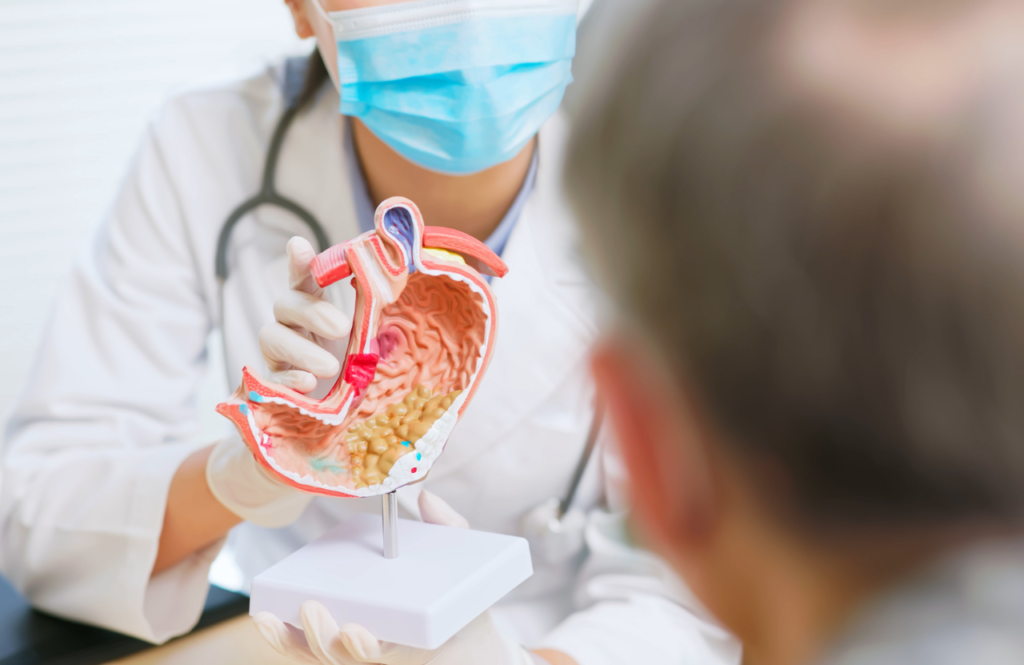
Acidity and bloating are common digestive issues. Acidity results from excessive stomach acid, causing heartburn and discomfort. Bloating is often due to gas build up in the digestive tract. Both can be triggered by diet, stress, or underlying health conditions.
Additionally, Dyspepsia (indigestion) is a term that describes discomfort and pain and sometimes other symptoms that come from your upper gut (the stomach, esophagus, or duodenum)
Symptoms of Acidity
The main symptom of acidity is usually pain or discomfort in the upper abdomen. In addition, other symptoms that may develop include: Bloating, belching, feeling full after eating, nausea, vomiting
Symptoms are often related to eating. Doctors used to include heartburn (a burning sensation felt in the lower chest area) and bitter-tasting liquid coming up into the back of the throat (sometimes called ‘waterbrash’) as symptoms of dyspepsia. However, these are now considered to be features of a condition called gastroesophageal reflux disease (GERD).
Symptoms tend to occur in bouts that come and go, rather than being present all the time. Most people have a bout of dyspepsia, often called indigestion, from time to time. For example, after a large spicy meal. In most cases, it soon goes away and is of little concern. However, some people have frequent bouts of dyspepsia, which affects their quality of life.
Treatment of Acidity and Bloating
The examination is usually normal if you have one of the common causes of dyspepsia. Your doctor will want to review any medicines that you have taken in case one may be causing the symptoms or making them worse. Following the initial assessment, depending on your circumstances, such as the severity and frequency of symptoms, your doctor may suggest one or more of the following plans of action.
Lifestyle changes include avoiding obesity, eating regular meals, quitting smoking, and not drinking too much alcohol.
When heartburn is a major symptom – the following may also be worth considering: Posture. Lying down or bending forward a lot during the day encourages reflux. Sitting hunched or wearing tight belts may put extra pressure on the stomach, which may make any reflux worse.
Bedtime – Go to bed with an empty, dry stomach. To do this, don’t eat in the last three hours before bedtime, and don’t drink in the last two hours before bedtime. If you are able, try raising the head of the bed by 10-20 cm (for example, with books or bricks under the bed’s legs). This helps gravity to keep acid from refluxing into the esophagus. If you do this, do not use additional pillows, because this may increase abdominal pressure.
Antacids are taken as required. A change or alteration in your current medication
This may be possible if a medicine that you are taking is thought to be causing the symptoms or making them worse.
A test to detect H. pylori is commonly done if you have frequent bouts of dyspepsia. It is the underlying cause of most duodenal and stomach ulcers and some cases of gastritis, duodenitis, and non-ulcer dyspepsia.
Acid-suppressing medication
Medication that reduces stomach acid may be considered – in particular, if: symptoms are more suggestive of acid reflux or oesophagitis, infection with H. pylori has been ruled out.
Further tests For Acidity and Bloating
Further tests are not needed in most cases. One or more of the above options will often sort out the problem. Reasons, why further tests may be advised, include: passing blood with your stools (blood can turn your stools black), vomiting blood, losing weight unintentionally, difficulty swallowing (dysphagia) or anemia, if you are aged over 55, if the symptoms are not typical and may be coming from outside the gut for example, to rule out problems of the gallbladder, pancreas, liver, etc, if the symptoms are severe and do not respond to treatment or if you have a risk factor for stomach cancer, such as Barrett’s esophagus, dysplasia, atrophic gastritis, or had ulcer surgery over 20 years earlier.
Tests advised may include Endoscopy, and blood test to check for anemia. If you are anaemic, it may be due to a bleeding ulcer, or to a bleeding stomach cancer. You may not notice the bleeding if it is not heavy, as the blood is passed out unnoticed in your stools.
- Tests of the gallbladder, pancreas, etc, if the cause of the symptoms is not clear.
H. pylori and dyspepsia
The germ (bacterium) H. pylori can infect the lining of the stomach and duodenum. It is one of the most common infections in the UK. More than a quarter of people in the UK become infected with H. pylori at some stage in their lives. Once you are infected, unless treated, the infection usually stays for the rest of your life.
Most people with H. pylori have no symptoms and do not know that they are infected. However, H. pylori is the most common cause of duodenal and stomach ulcers.
Other uncommon causes of dyspepsia
Other problems of the upper gut, such as stomach cancer and esophageal cancer, can cause dyspepsia when they first develop.